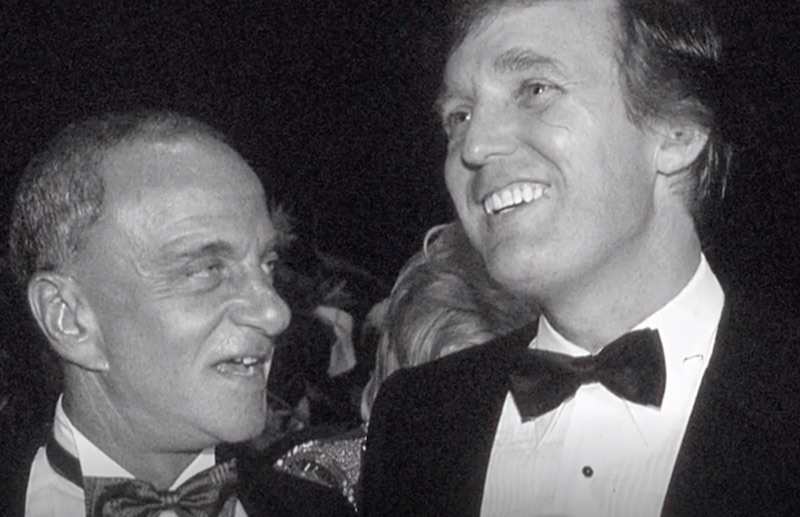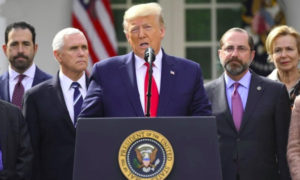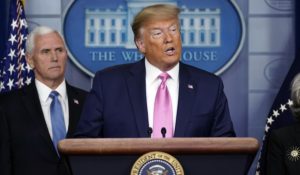The Modern Machiavelli Who Predicted Trump’s Rise
A new documentary chronicles the life and exploits of Roy Cohn, the audacious opportunist who cultivated our current president. Roy Cohn, left, chats with a smiling Donald Trump in this early '80s footage featured in "Where's My Roy Cohn?" (IMDb)
Roy Cohn, left, chats with a smiling Donald Trump in this early '80s footage featured in "Where's My Roy Cohn?" (IMDb)
Early in the Mueller investigation, President Trump rankled at then-Attorney General Jeff Sessions’ reluctance to circle the wagons on his behalf. “Where’s my Roy Cohn?” the president asked, name-checking his unscrupulous mentor, lawyer and fixer.
Trump had been in cahoots with Cohn since they met in a Manhattan nightclub in 1973. By then, Cohn, prosecutor of the infamous Rosenberg trial and later assistant to Wisconsin Sen. Joe McCarthy during the House Un-American Activities Committee hearings, had earned his stripes as a notorious scoundrel. Perhaps he felt it was time to pass his villainous lessons to a new generation—or maybe he just wanted to sleep with the young real estate developer—but Cohn chose to mentor Trump for over a decade in Manhattan’s high-stakes world of media, money and power.
A clue to Cohn’s motivation can be found in filmmaker Matt Tyrnauer’s new documentary, “Where’s My Roy Cohn?” in theaters beginning Friday. In a vintage 1979 clip, Cohn is seated at home, reading a letter from Trump and mooning over a framed photo of the two of them. He calls it one of his dearest treasures and says that Trump will rise from New York and touch every part of the country, even extending his reach globally.
“He sort of Nostradamus-like predicts a world dominated by Donald Trump, which, in the late ’70s, was quite a stretch,” Tyrnauer, a former Vanity Fair writer, told Truthdig. “Roy Cohn would have been a small footnote to American history had Trump not won the Electoral College. After Trump did win, Cohn is elevated to a modern Machiavelli.”
From the beginning of his career, Cohn forged the way for sociopathic legal manipulations, his brilliance undercompensating for his moral turpitude. As far back as age 15, he used his family’s legal connections to fix parking tickets for teachers. Graduating from Columbia Law School at the age of 20, he had to wait until his 21st birthday before he could take the bar exam.
Within two years, he was making international headlines working with prosecutors in the case against Julius and Ethel Rosenberg. While Julius was convicted of espionage under convincing evidence, the essentially blameless Ethel was also convicted in 1951, with Cohn pushing for the death penalty. Using predatory prosecutorial tactics, he pressured Ethel’s brother, David Greenglass, into changing his testimony. Greenglass later said he was encouraged by the prosecution to lie in the courtroom in order to protect himself and his wife.
“Part of my goal in this film was to show his progression into this monster. There were some clues, especially the mother, Dora,” Tyrnauer said. Cohn’s mother was so shrewish, according to the movie, that her powerful family had to promise Cohn’s father a judgeship in order to get him to marry her.
According to Tyrnauer, Cohn sought the death penalty in the Rosenberg case in order to heighten the sensation around it and garner as much attention for himself as possible. If so, his tactic worked. Then-FBI Director J. Edgar Hoover took notice, recommending that Cohn assist McCarthy on the House Un-American Activities Committee and the Army-McCarthy hearings of 1954, as well as the so-called “Lavender Scare,” which persecuted homosexuals.
Drafted by Cohn as part of the team was David Schine, a tall, blond hotel heir for whom Cohn seems to pine. When Schine enlists to fight in Korea, Cohn’s attempts to land him a cushy position draw scrutiny. In the movie’s most emotional scene, a chamber full of heterosexual men laughingly wonder if the Pixie camera used to photograph evidence is in any way related to fairies. As they chuckle salaciously, Cohn, who was gay (despite his claims to the contrary), and McCarthy, who was rumored to be gay, sit stone-faced, humiliated, and, for a brief moment, sympathetic.
“Certainly Cohn seemed to have a type, and that was the tall blond rich kids. David Schine was the prototype of that. With Trump, there was a passing resemblance between the two, and they were the same kind of profile,” Tyrnauer observed.
In 1973, Trump Management Inc. was hit with a federal housing discrimination lawsuit based on overwhelming evidence that it had been shutting out nonwhite renters, going so far as to label applications with a “C” for “colored.” Cohn fought the suit to a settlement, which is not the same as an admission of guilt, a ploy that has become a mainstay in the Trump playbook. Years later, Trump settled to the tune of $25 million in the Trump University lawsuit, and has settled with plaintiffs in roughly 100 additional cases.
In those days, Cohn was working out of his East Side townhouse in Manhattan, a bachelor pad-turned-office overrun with stuffed toy frogs and handsome young assistants. He flitted to Studio 54 and all the right parties in his Rolls Royce limousine with his “fiance,” Barbara Walters, on his arm, a beard (and a pointless one at that). Andy Warhol, Mayor Ed Koch and gangster “Fat Tony” Salerno were all friends in his work-hard play-hard lifestyle. On one hand, he successfully fended off federal misconduct investigations into perjury and witness tampering (three times over 10 years, while also beating financial improprieties charges), and on the other, he shielded characters like Trump, media mogol Rupert Murdoch and mobsters John Gotti and Carlo Gambino from justice.
It wasn’t until 1986, three months before Cohn died of AIDS, that a five-judge panel of the Appellate Division of the New York State Supreme Court finally disbarred him for unethical and unprofessional conduct, including misappropriation of clients’ funds, lying on a bar application and pressuring a client to amend his will. Speaking as character witnesses on Cohn’s behalf were New York Times columnist William Safire, Barbara Walters and William Buckley Jr. Trump, however, stayed clear of his disgraced and dying mentor, who helped secure a federal judgeship for Trump’s sister, Maryanne Trump Barry, as a final favor. A widely circulated story at the time tells of Trump giving Cohn a pair of diamond cufflinks, which later turned out to be fake. “I can’t believe he’s doing this to me,” Cohn said. “Donald pisses ice water.”
“He occupies a unique place in the second half of the 20th century for his masterful villainy, but now, after the advent of the Trump presidency, more his posthumous significance in having created a president from beyond the grave,” Tyrnauer said, trailing off at the sheer unlikelihood of it all. “The paranoid style of American politics is very much alive. It’s embodied by Cohn, who passed it along to Trump. It’s an enormous endemic problem in our political culture. I think we thought we were over it, but we’re not.”
Your support matters…Independent journalism is under threat and overshadowed by heavily funded mainstream media.
You can help level the playing field. Become a member.
Your tax-deductible contribution keeps us digging beneath the headlines to give you thought-provoking, investigative reporting and analysis that unearths what's really happening- without compromise.
Give today to support our courageous, independent journalists.






You need to be a supporter to comment.
There are currently no responses to this article.
Be the first to respond.